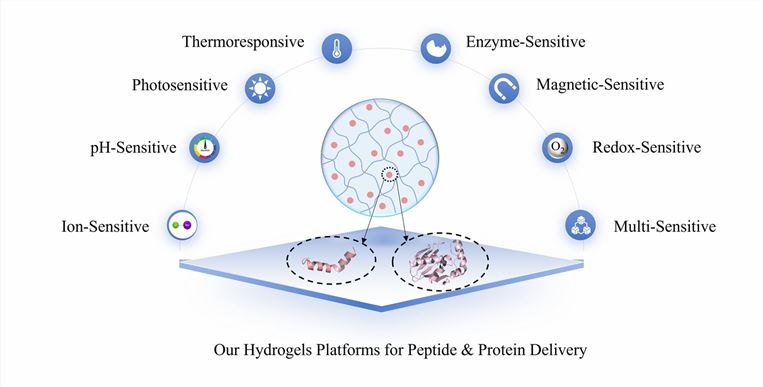Hydrogel Development for Peptide & Protein Delivery
InquiryAt CD Formulation, we leverage the versatility of hydrogels to create tailored platforms for precise peptide and protein delivery. With our extensive experience, our formulation scientists specialize in designing hydrogels that are customized to the specific needs of our clients' molecules. Through meticulous optimization, we ensure that these smart biomaterials provide precise control over release kinetics, enabling targeted delivery.
Hydrogels for Peptide & Protein Delivery
Peptide and protein therapeutics demonstrate great promise when delivered via hydrogels, a versatile class of biomaterials. These large biomolecules are encapsulated and protected efficiently by hydrogels' high content of water and tunable porous structure. Hydrogels can be engineered to be responsive to various physiological stimuli through proper material selection and design. This stimulus-responsive capability enables controlled, targeted release of encapsulated peptides and proteins over an extended period.
Types of Hydrogels We Can Develop for Peptide and Protein Delivery

Our Hydrogel Development Process
| Material Selection |
- Carefully choose polymers with appropriate properties.
- Select crosslinkers that enable the formation of a stable hydrogel network.
|
| Formulation Design |
- Optimize polymer concentration to achieve desired mechanical strength and gelation properties.
- Fine-tune peptide/protein loading to achieve optimal therapeutic dose and stability.
|
| Hydrogel Synthesis |
- Utilize appropriate techniques such as chemical crosslinking, physical gelation, or photo-crosslinking to form the hydrogel network.
|
| Characterization |
- Incorporate peptides/proteins into the hydrogel matrix using methods such as physical entrapment, covalent conjugation, or electrostatic interactions.
|
| Release Studies |
- Conduct release studies to evaluate the controlled release profiles of peptides/proteins from the hydrogel.
- Assess factors such as release kinetics, duration, and responsiveness to environmental stimuli.
|
| Optimization |
- Fine-tune the hydrogel composition, crosslinking parameters, and peptide/protein loading to achieve desired efficacy.
|
Applications of Our Peptide & Protein Hydrogel Development Services
- Controlled Release Systems
Proteins and peptides can be released at controlled rates using hydrogels. We can design hydrogel matrices to respond to various stimuli such as pH, temperature, enzymes or light, enabling precise control of release kinetics.
- Injectable Delivery Systems
We can help customers design hydrogels into injectable formulations that undergo a sol-gel transition in response to physiological conditions to form a local depot at the injection site.
- Tissue Engineering Scaffolds
Hydrogels can mimic the extracellular matrix (ECM) environment and provide suitable conditions for cell growth and proliferation. We can integrate bioactive peptides and proteins into hydrogel scaffolds to exert their functions of enhancing cell activity, promoting tissue regeneration and delivering bioactive factors.
Hydrogels have adhesive properties that allow them to adhere to biological tissues. We can apply this property to mucosal drug delivery. By incorporating peptides and proteins into hydrogels and applying them to oral, nasal or other mucosal surfaces, targeted delivery of drugs to specific tissues or organs can be achieved.
Hydrogels can be used as implantable devices for sustained peptide and protein delivery. We can help customers design hydrogel implants that release therapeutics over an extended period of time, thereby eliminating frequent injections and improving patient compliance.
Advantages of Our Hydrogel Development Services for Peptide & Protein Delivery
- Customizable materials for each client's unique molecules.
- Tailored release kinetics and doses tuned to physiological conditions in target tissues.
- Controlled delivery ranging from hours to months based on formulation.
- Targeted administration through external triggers like temperature, light or magnetism.
- Biocompatible carriers that are non-toxic and integrate with the body.
- Encapsulation preserves higher-order structures vital for protein activity.
- Versatile platform compatible with hydrophilic and hydrophobic peptides/proteins.
CD Formulation offers full-service hydrogel development programs to meet the unique needs of our biopharmaceutical clients. As industry leaders in this field, we utilize a multidisciplinary approach involving computational modeling, materials engineering and analytical testing. Contact us today and benefit from our full-scale support and customized solutions!
Reference
- Vermonden T.; et al. Hydrogels for protein delivery. Chemical reviews, 2012, 112(5): 2853-2888.
Related Services



